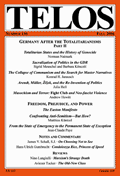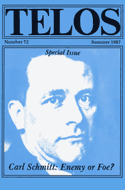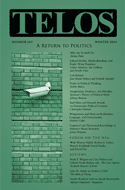By Lewis West · Friday, March 13, 2015  Catastrophic history does not free society: it allows the individual no exit from an endless spiral of destruction. Such destruction promises liberation for some, but it only tilts the world closer to ever-greater annihilation. To place one’s hope in redemptive violence constitutes a leap into the absurd. It is an act of pure faith. This is how Julia Hell, in her essay “Remnants of Totalitarianism: Hannah Arendt, Heiner Müller, Slavoj Žižek, and the Re-Invention of Politics,” reads the apocalyptic politics of Müller and Žižek. Hell frames her critique with a rigorous practicality: she laments Žižek’s “empty terms,” and likewise she sees the political writings of Giorgio Agamben and Judith Butler as hopelessly vague (103). Yet Hell’s rejection of Müller and Žižek does not reflect an entirely pragmatic method. While Hell insists on the need for a usable, specific politics, her attentive readings of each thinker also point to a vast philosophical disagreement. In the end, the true debate is not over the applications of theory. It is instead over the answer to a single question: what is the relationship of politics to death? Catastrophic history does not free society: it allows the individual no exit from an endless spiral of destruction. Such destruction promises liberation for some, but it only tilts the world closer to ever-greater annihilation. To place one’s hope in redemptive violence constitutes a leap into the absurd. It is an act of pure faith. This is how Julia Hell, in her essay “Remnants of Totalitarianism: Hannah Arendt, Heiner Müller, Slavoj Žižek, and the Re-Invention of Politics,” reads the apocalyptic politics of Müller and Žižek. Hell frames her critique with a rigorous practicality: she laments Žižek’s “empty terms,” and likewise she sees the political writings of Giorgio Agamben and Judith Butler as hopelessly vague (103). Yet Hell’s rejection of Müller and Žižek does not reflect an entirely pragmatic method. While Hell insists on the need for a usable, specific politics, her attentive readings of each thinker also point to a vast philosophical disagreement. In the end, the true debate is not over the applications of theory. It is instead over the answer to a single question: what is the relationship of politics to death?
Continue reading →
By Telos Press · Monday, March 2, 2015 In an incisive and thoughtful review essay in Quadrant (March 2015), Peter Murphy examines Joel Kotkin’s The New Class Conflict and the prognosis for America in the “post-creative economy.” Read the full essay (subscription required) at Quadrant Online. Purchase your copy of The New Class Conflict in our online store.
Continue reading →
By Linas Jokubaitis · Wednesday, February 11, 2015  In his essay “Political Aesthetics: Carl Schmitt on Hamlet,” David Pan puts forward an interpretation of the relationship between aesthetics and politics in Schmitt’s discussion of Hamlet. Today the question about the relationship of aesthetics and politics in the thought of German jurist is a widely discussed topic. According to one interpretation, which is best represented by a sentence of Jürgen Habermas, “Carl Schmitt’s polemical discussion of political Romanticism conceals the aestheticizing oscillations of his own political thought.” But according to Schmitt’s self-understanding, this interpretation could not be further from the truth. In his essay “Political Aesthetics: Carl Schmitt on Hamlet,” David Pan puts forward an interpretation of the relationship between aesthetics and politics in Schmitt’s discussion of Hamlet. Today the question about the relationship of aesthetics and politics in the thought of German jurist is a widely discussed topic. According to one interpretation, which is best represented by a sentence of Jürgen Habermas, “Carl Schmitt’s polemical discussion of political Romanticism conceals the aestheticizing oscillations of his own political thought.” But according to Schmitt’s self-understanding, this interpretation could not be further from the truth.
Continue reading →
By Johnny Brennan · Monday, January 5, 2015 Johnny Brennan’s “Imagination, Prophecy, and Morality: The Relevance and Limits of Spinoza’s Theory of Political Myth” appears in Telos 169 (Winter 2014). Read the full version online at the Telos Online website, or purchase a print copy of the issue in our store.
 How should we understand myth in the political realm? Some see myth as a dangerous form of regression that allows its utilizers to reorient the consciousness of a population toward dangerous ends. Others see myth as a necessary spark to incite revolutionary progress; myth brings with it the emotional charge needed to unite a population into action. Yet others see myth as a set of training wheels helpful for grasping more difficult and abstract concepts—training wheels which some are never meant to take off. Spinoza stands unique in that he is able to incorporate all of these dimensions of political myth. His motivating question is not what myth is, but rather what are its legitimate uses. Myth can be progress, but used improperly can also lead to regression. Myth relies on the basest form of knowledge in order to be able to communicate to all people, but cannot last if it is blindly accepted. Myth, for Spinoza, is inseparable from our lives and from society; it is a part of our mental construction and in that manner can be used for progress. But myth also has its limits, and should it surpass those limits it can lead to a culture of superstition that will regress to more primitive forms. Spinoza’s is a more successful theory of political myth because it is more accepting of, and true to, the way myth acts in our individual and social lives. How should we understand myth in the political realm? Some see myth as a dangerous form of regression that allows its utilizers to reorient the consciousness of a population toward dangerous ends. Others see myth as a necessary spark to incite revolutionary progress; myth brings with it the emotional charge needed to unite a population into action. Yet others see myth as a set of training wheels helpful for grasping more difficult and abstract concepts—training wheels which some are never meant to take off. Spinoza stands unique in that he is able to incorporate all of these dimensions of political myth. His motivating question is not what myth is, but rather what are its legitimate uses. Myth can be progress, but used improperly can also lead to regression. Myth relies on the basest form of knowledge in order to be able to communicate to all people, but cannot last if it is blindly accepted. Myth, for Spinoza, is inseparable from our lives and from society; it is a part of our mental construction and in that manner can be used for progress. But myth also has its limits, and should it surpass those limits it can lead to a culture of superstition that will regress to more primitive forms. Spinoza’s is a more successful theory of political myth because it is more accepting of, and true to, the way myth acts in our individual and social lives.
Continue reading →
By Russell A. Berman · Monday, December 15, 2014 Telos 169 (Winter 2014) is now available for purchase in our store.
 In recent years, there has been much hand-wringing over widespread apathy, not only among young generations but throughout the public. Politics, so critics have been claiming, has become a matter exclusively of media manipulation, of a manufactured consensus foisted on a malleable citizenry. This dystopian vision allegedly held not only in the United States (although perhaps especially here) but across much of the globe. Democratization movements appeared to have been crushed, whether in Iran or China, as the leadership in the West—once the premier advocate of democratic transformation—opted instead for the realpolitik of deals with rulers, no matter how unsavory, over support for popular movements, no matter how just. In recent years, there has been much hand-wringing over widespread apathy, not only among young generations but throughout the public. Politics, so critics have been claiming, has become a matter exclusively of media manipulation, of a manufactured consensus foisted on a malleable citizenry. This dystopian vision allegedly held not only in the United States (although perhaps especially here) but across much of the globe. Democratization movements appeared to have been crushed, whether in Iran or China, as the leadership in the West—once the premier advocate of democratic transformation—opted instead for the realpolitik of deals with rulers, no matter how unsavory, over support for popular movements, no matter how just.
Continue reading →
By Telos Press · Friday, September 19, 2014 Writing at the Financial Times today, Daniel Ben-Ami reviews Joel Kotkin’s The New Class Conflict, now available from Telos Press. Save 30% when you order your copy in our online store.
 Any serious attempt to understand the US’s current impasse by moving outside the conventional framework should be welcome. The stale pairings of liberal and conservative, right and left, no longer cut it. Any serious attempt to understand the US’s current impasse by moving outside the conventional framework should be welcome. The stale pairings of liberal and conservative, right and left, no longer cut it.
Joel Kotkin, an American academic and author, has come up with the unlikely proposal of understanding the country’s predicament in terms of class conflict. But his conception is a world away from the old socialist notion of a combative proletariat battling against an intransigent ruling class. Instead, his is an innovative attempt to rethink the main contours of US society.
Continue reading →
|
|
 Catastrophic history does not free society: it allows the individual no exit from an endless spiral of destruction. Such destruction promises liberation for some, but it only tilts the world closer to ever-greater annihilation. To place one’s hope in redemptive violence constitutes a leap into the absurd. It is an act of pure faith. This is how Julia Hell, in her essay “Remnants of Totalitarianism: Hannah Arendt, Heiner Müller, Slavoj Žižek, and the Re-Invention of Politics,” reads the apocalyptic politics of Müller and Žižek. Hell frames her critique with a rigorous practicality: she laments Žižek’s “empty terms,” and likewise she sees the political writings of Giorgio Agamben and Judith Butler as hopelessly vague (103). Yet Hell’s rejection of Müller and Žižek does not reflect an entirely pragmatic method. While Hell insists on the need for a usable, specific politics, her attentive readings of each thinker also point to a vast philosophical disagreement. In the end, the true debate is not over the applications of theory. It is instead over the answer to a single question: what is the relationship of politics to death?
Catastrophic history does not free society: it allows the individual no exit from an endless spiral of destruction. Such destruction promises liberation for some, but it only tilts the world closer to ever-greater annihilation. To place one’s hope in redemptive violence constitutes a leap into the absurd. It is an act of pure faith. This is how Julia Hell, in her essay “Remnants of Totalitarianism: Hannah Arendt, Heiner Müller, Slavoj Žižek, and the Re-Invention of Politics,” reads the apocalyptic politics of Müller and Žižek. Hell frames her critique with a rigorous practicality: she laments Žižek’s “empty terms,” and likewise she sees the political writings of Giorgio Agamben and Judith Butler as hopelessly vague (103). Yet Hell’s rejection of Müller and Žižek does not reflect an entirely pragmatic method. While Hell insists on the need for a usable, specific politics, her attentive readings of each thinker also point to a vast philosophical disagreement. In the end, the true debate is not over the applications of theory. It is instead over the answer to a single question: what is the relationship of politics to death?  In his essay “Political Aesthetics: Carl Schmitt on Hamlet,” David Pan puts forward an interpretation of the relationship between aesthetics and politics in Schmitt’s discussion of Hamlet. Today the question about the relationship of aesthetics and politics in the thought of German jurist is a widely discussed topic. According to one interpretation, which is best represented by a sentence of Jürgen Habermas, “Carl Schmitt’s polemical discussion of political Romanticism conceals the aestheticizing oscillations of his own political thought.” But according to Schmitt’s self-understanding, this interpretation could not be further from the truth.
In his essay “Political Aesthetics: Carl Schmitt on Hamlet,” David Pan puts forward an interpretation of the relationship between aesthetics and politics in Schmitt’s discussion of Hamlet. Today the question about the relationship of aesthetics and politics in the thought of German jurist is a widely discussed topic. According to one interpretation, which is best represented by a sentence of Jürgen Habermas, “Carl Schmitt’s polemical discussion of political Romanticism conceals the aestheticizing oscillations of his own political thought.” But according to Schmitt’s self-understanding, this interpretation could not be further from the truth.  How should we understand myth in the political realm? Some see myth as a dangerous form of regression that allows its utilizers to reorient the consciousness of a population toward dangerous ends. Others see myth as a necessary spark to incite revolutionary progress; myth brings with it the emotional charge needed to unite a population into action. Yet others see myth as a set of training wheels helpful for grasping more difficult and abstract concepts—training wheels which some are never meant to take off. Spinoza stands unique in that he is able to incorporate all of these dimensions of political myth. His motivating question is not what myth is, but rather what are its legitimate uses. Myth can be progress, but used improperly can also lead to regression. Myth relies on the basest form of knowledge in order to be able to communicate to all people, but cannot last if it is blindly accepted. Myth, for Spinoza, is inseparable from our lives and from society; it is a part of our mental construction and in that manner can be used for progress. But myth also has its limits, and should it surpass those limits it can lead to a culture of superstition that will regress to more primitive forms. Spinoza’s is a more successful theory of political myth because it is more accepting of, and true to, the way myth acts in our individual and social lives.
How should we understand myth in the political realm? Some see myth as a dangerous form of regression that allows its utilizers to reorient the consciousness of a population toward dangerous ends. Others see myth as a necessary spark to incite revolutionary progress; myth brings with it the emotional charge needed to unite a population into action. Yet others see myth as a set of training wheels helpful for grasping more difficult and abstract concepts—training wheels which some are never meant to take off. Spinoza stands unique in that he is able to incorporate all of these dimensions of political myth. His motivating question is not what myth is, but rather what are its legitimate uses. Myth can be progress, but used improperly can also lead to regression. Myth relies on the basest form of knowledge in order to be able to communicate to all people, but cannot last if it is blindly accepted. Myth, for Spinoza, is inseparable from our lives and from society; it is a part of our mental construction and in that manner can be used for progress. But myth also has its limits, and should it surpass those limits it can lead to a culture of superstition that will regress to more primitive forms. Spinoza’s is a more successful theory of political myth because it is more accepting of, and true to, the way myth acts in our individual and social lives. 


